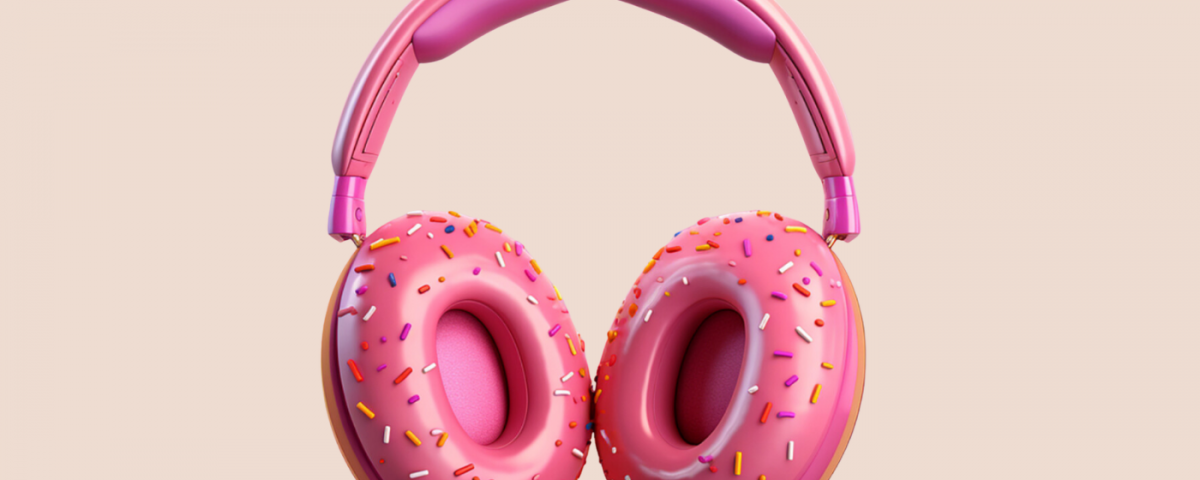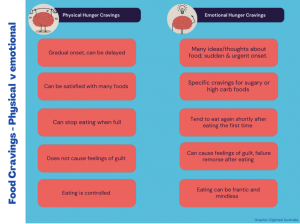
Is that repetitive voice in your head telling you to eat donuts again? Constantly thinking about what you will eat next? The Winnett Specialist team offers their top tips on reducing “food noise”.
The Surgeon’s Perspective
“Whether you’re considering bariatric surgery, post bariatric surgery – or just want to lose a few unwanted kilos, it’s important to understand the powerful internal signals between our brain and our gut that can lead to a barrage of food thoughts and cravings,” says Mr Jason Winnett, bariatric and laparoscopic surgeon at the Winnett Specialist Group.
“Cravings can be triggered by external cues (such as the smell of freshly baked bread), simply seeing a tub of ice-cream in the fridge, or listening to someone talk about pizza,” he says.
“They can also be caused by internal cues driven by hormones involved in hunger and appetite.
“These thoughts can be highly intrusive, causing significant dysfunction and rumination. Some patients will tell me they spend hours a day thinking about food.”
Obesity Medications
For people with diabetes and obesity, medications such as Semaglutide can dampen food cravings significantly, says Mr Winnett.
He says the efficacy of Semaglutide was first confirmed in 2021 in The New England Journal of Medicine, resulting in 14.9% weight loss compared to 2.4% placebo in 1961 subjects over 68 weeks.*1
“It’s thought weight loss medication may stimulate the hypothalamus, the brain area that plays a role in controlling hunger and satiety,” he says.
However, downsides are the cost of monthly medication (more than $130) and the fact that patients generally pile the weight on again when they stop*2.
“Semaglutide is generally well tolerated but common side effects can include diarrhoea, nausea. Rare side effects include pancreatic inflammation or very rarely gastroparesis, a chronic and paralysing condition which prevents proper stomach emptying and can cause vomiting, a feeling of fullness, pain, and bloating.”
Mr Winnett says weight loss medications have an important place for the treatment of diabetes and extreme obesity, or for pre-bariatric surgical patients. However, given current supply issues globally and the risk of rare side effects, it should be prescribed “judiciously.”
Mr Winnett says in cases of severe food thought intrusion, medical interventions such as Sleeve surgery, Bypass surgery, and Balloon insertion can all dampen the brain’s hunger drivers and these procedures remain the gold standard long-term treatment for obesity.
The Psychologist’s Insight
We get up in the morning, open the fridge, and see last night’s leftovers. At the train station, there are a plethora of vending machine snacks that can be in our hot little hands in seconds with the mere tap of a credit card. Perhaps there’s a birthday cake at the office’s morning tea and cocktails at a work function in the evening, or pizza night with the family.
“With the Internet, TV, Twitter, TikTok, Food Apps, home delivery at our fingertips, we are living in an era where we are constantly surrounded by food,” says Winnett Specialist Group Psychologist Georgie Beames.
“That’s why it’s so important not to give yourself a blanket excuse to eat every time you have a ruminating (or even an unconscious thought) that says, ‘I’m stressed,’ ‘I’m angry,’ ‘I’m unappreciated,’ ‘I haven’t got time to cook,’ ‘I’m bored,’ ‘I’m a failure.’”
She adds that sometimes the level of food chatter we have in our head can have very deep roots.
“It may be linked back to childhood if there were frequent comments about weight and food portions. Or at the other end of the scale, there were very few boundaries set when it came to eating healthy food.”
Top Tips to Reduce Food Noise
- Pause and Evaluate – Every time you have a craving, deliberately stop and pause. Are you really hungry or hungry because you’re bored, tired, or frustrated?
- Delay with Distraction – When you experience food noise, delay with distraction – paint your nails, go for a walk, do a five-minute mindfulness meditation, have a bath or make a work phone call.
- Scheduled Indulgence – Consciously diarise one or two days a week where you can have a glass of wine and a piece of chocolate or eat out. But otherwise try to maintain your regular goals for the rest of the period including three or four days of intermittent fasting.
- Out of Sight, Out of Mind – Avoid junk food, soft drinks, cakes, and biscuits in the house as much as possible. If you do keep occasional treats at home, keep them hidden at the back of the freezer or pantry.
- Track Intake – Diarise, photograph, or use an app to track KJ.
- Mindset Control –“Medical interventions are not a magic pill. They help but in the end, it’s YOU who decides to get on the treadmill or what to put in your fridge.”

The Dietitian’s Advice
The mainstay of dietary requirements for weight loss is eating protein at EVERY meal, says Winnett Specialist Group Dietitian Ashleigh Gale.
“This includes eggs, lean meats, chicken and fish, tofu, and yoghurt (encourage patients to seek out high protein brands in supermarkets that have 17g or more of protein on the label),”
Top Tips from the Dietitian
- Substitutes – Substitute rice, pasta, and white or brown bread with lower carb bread, beans/lentils or legumes, and smaller amounts of pumpkin or potato.
- Portion Control – Think of a smaller portion size when eating. Use a dessert plate instead of a dinner plate.
- Plate Composition – Fill the plate with protein first as well as bulking out your portion and leafy salads or veggies, rather than white bread or pasta or potato salads.
- Dressings – Choose lemon vinaigrette with small amounts of extra virgin olive oil rather than any creamy dressings.
- Low GI Fruits – Eat low GI fruits such as apples, oranges, strawberries, blueberries, and plums as opposed to sweets or high GI fruits such as ripe bananas, rockmelon, pineapple, and watermelon.
- Healthy Snacks – Good options for savoury cravings include nuts, turkey breast instead of salami, fresh peeled prawns, and grilled seafood instead of sausages and cured meats.
- Drink Control – Downsize glasses at home. Opt for a small (125 ml) wine glass rather than a large (250 ml) glass. Drink only water, do not buy or consume juices and soft drinks. Limit to one or two glasses of alcohol a week only – especially for bariatric surgery patients.
- Exercise and Sleep – Aim for at least 10,000 steps a day plus at least two or three resistance sessions a week. Make sleep a priority.
At Winnett Specialist Group, we provide a holistic approach to weight loss support, including expert advice from surgeons, psychologists, and dietitians, designed to help you achieve lasting results. If you’re ready to take control of your health and achieve your weight loss goals, please contact us or call us at (03) 9417 1555. Let us guide you on your path to a healthier, happier you.
Mr Jason Winnett
Laparoscopic and Bariatric Surgeon

Georgie Beames
Psychologist

Ashleigh Gale
Dietitian
www.winnettspecialistgroup.com.au
Queens Terrace, 382 Victoria Parade, East Melbourne 3002
References:
5 The weight-loss drug Wegovy may also help treat addiction (sciencenews.org)
7 Ozempic Lawsuit: May 2024 Gastroparesis Lawsuit Update (drugwatch.com)




